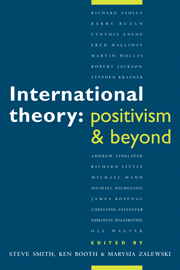Book contents
- Frontmatter
- Contents
- List of contributors
- Preface and acknowledgements
- Introduction
- I Debates
- II Legacies
- III Silences
- 7 The rise and fall of the inter-paradigm debate
- 8 Margins, silences and bottom rungs: how to overcome the underestimation of power in the study of international relations
- 9 Is there a classical international theory?
- IV Openings
- V Directions
- Index
7 - The rise and fall of the inter-paradigm debate
Published online by Cambridge University Press: 09 March 2010
- Frontmatter
- Contents
- List of contributors
- Preface and acknowledgements
- Introduction
- I Debates
- II Legacies
- III Silences
- 7 The rise and fall of the inter-paradigm debate
- 8 Margins, silences and bottom rungs: how to overcome the underestimation of power in the study of international relations
- 9 Is there a classical international theory?
- IV Openings
- V Directions
- Index
Summary
The separation of concepts applicable to groups from those applicable to individuals is a powerful tool for eliminating the solipsism characteristic of traditional methodologies. Science becomes intrinsically a group activity, no longer even idealizable as a one-person game.
Thomas S. Kuhn (1993, p. xiii)A standard textbook presentation of International Relations (IR) has it that there are three paradigms, three dominant schools. The first is realism, the second is alternately called pluralism, interdependence and world society but it is in some sense always the liberal approach, and the third is Marxism or more broadly radicalism, structuralism or globalism. Some writers claim that this is the timeless pattern of International Relations debate – even in the classics, we find these three types of thinking (Kauppi and Viotti, 1992; Viotti and Kauppi 1993 [1987]). Others will be more restrictive and say the discipline became like this at some point, e.g. in the 1970s (Holsti, 1985). Not everyone, however, cherishes this categorisation.
Is it vague and arbitrary? (Why these three? Why three? Where do you place the Neo-realism/Neo-liberalism debate?) No, all typologies are problematic – this no more than others. Such will not be my main line of criticism. A fairly coherent construction can be made (and will be presented in section 1).
But ‘the debate’ is a misleading map and a bad guide to introduce students to. This is not the pattern of debate today. The story about an ‘inter-paradigm debate’ does not give a grip on the ongoing controversies in the discipline.
- Type
- Chapter
- Information
- International TheoryPositivism and Beyond, pp. 149 - 185Publisher: Cambridge University PressPrint publication year: 1996
- 104
- Cited by



